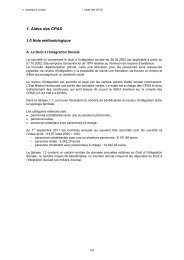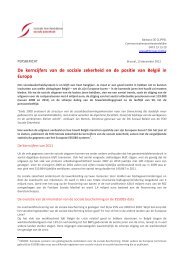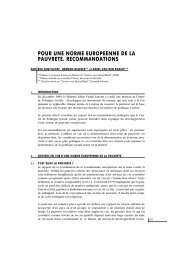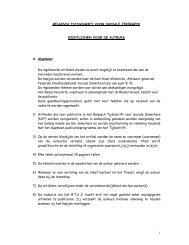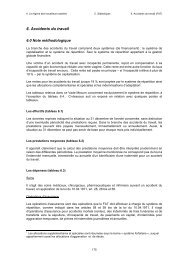social security - FOD Sociale Zekerheid
social security - FOD Sociale Zekerheid
social security - FOD Sociale Zekerheid
- No tags were found...
Create successful ePaper yourself
Turn your PDF publications into a flip-book with our unique Google optimized e-Paper software.
E. The Charter of the <strong>social</strong>ly insuredSince 1st January 1997, a new law, solemnly called 'the Charter of the <strong>social</strong>ly insured' has comeinto force. The charter contains a number of important principles concerning the rights andobligations of the population (the <strong>social</strong>ly insured) in their contacts with the <strong>social</strong> <strong>security</strong>institutions. Most rights and obligations have existed for a long time already, but the chartergives them a more systematic character. The main purpose of the charter is to protect thepopulation through a whole set of rules to be respected by all <strong>social</strong> <strong>security</strong> institutions. Allof them, that also means the semi-public institutions for salaried persons, self-employed personsand civil servants, but also the institutions for <strong>social</strong> assistance. Here, we limit ourselves to themajor principles of the charter without discussing the exceptions further.In the first place, the <strong>social</strong> <strong>security</strong> institution is obliged to inform the population about itsrights as clearly as possible. On the one hand, the <strong>social</strong>ly insured might ask specific questionsto an institution, on the other hand the <strong>social</strong> <strong>security</strong> institution is obliged to take initiatives toinform the population. If it appears that someone is entitled to a particular benefit, the institutionshall be obliged to grant it.An application for benefits must be answered by the <strong>social</strong> <strong>security</strong> institution in a term as shortas possible. Within four months, the <strong>social</strong> <strong>security</strong> institution should inform the applicant ofits decision and then, within four months, pay the benefit. In case of delay, the <strong>social</strong> <strong>security</strong>institution must pay interests to the entitled.With every decision, the institution must inform the <strong>social</strong>ly insured of all the possibilities forappeal, the reasons for a decision, the reference number of the file, etc.The term for appeal for a body of law (mostly the labour court) against a decision of a <strong>social</strong><strong>security</strong> institution is at least three months now.The Social Charter clearly illustrates the government's willingness to inform its citizens moreand better. At the end of this brochure, you will find a list with the addresses and telephonenumbers of most of the administrations and public <strong>social</strong> <strong>security</strong> institutions you can addressyour questions and problems to.F. Indexation of the <strong>social</strong> benefitsThe automatic adaptation of the <strong>social</strong> benefits to the evolution of the consumer price index aimsto avoid the inflation to erode the purchasing too much. The law of 2 August 1971 is the referencelaw with regard to the indexation of the <strong>social</strong> benefits.The benefits are raised when the measured increase of the cost of life reaches 2 %. The impulsefor the indexation is given each time an index, the so-called "levelled heath index", reaches anamount called "pivot index". The levelled health index is the mathematic average of the healthindices of the month in question and the three preceding months. The amounts that are paid outevery month are adapted as from the month following the month in the course of which the pivotindex was reached.For example, the average of the indices of January, February, March and April 2011 reached thepivot index. The monthly <strong>social</strong> benefits were thus raised the following month, i.e. in May 2011.10



